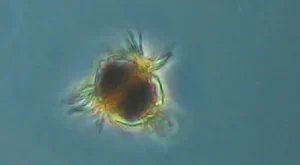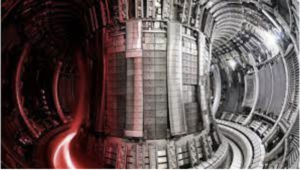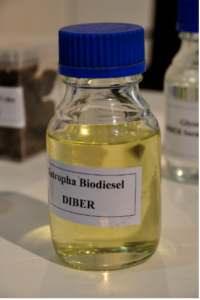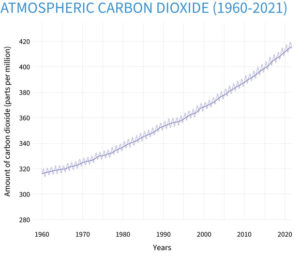How do they work and how can they be used?
The use of gasoline and diesel as fuels has been heavily debated over the past few years as people have realized they release many harmful chemicals into the environment. Recently, hydrogen fuel cells are being explored as another source of energy.
Hydrogen fuel cells are highly compact cells that create electricity through the chemical energy stored in hydrogen bonds, and release heat and water as byproducts. Fuel cells were first created in 1838 by William Robert Grove (8). However, they are hard to use since “there’s virtually no pure hydrogen on Earth because it’s so reactive” (9). Fuel cells are made up of an electricity-conducting electrolyte, surrounded by an anode, which is negatively charged, and a cathode, which is positively charged (6). Hydrogen, or other fuels, enters through the anode and breaks down into protons and electrons. The protons flow through the electrolyte while the electrons flow through an “external circuit,” where they generate electricity (1). At the cathode end, oxygen meets with the electrons and protons to form water and heat (1). Thus, hydrogen fuel cells are able to generate electricity and energy while only releasing water vapor and heat into the atmosphere.

Hydrogen fuel cells have many different applications because they provide energy without contributing to global warming and climate change, and they are incredibly efficient. NASA has started using hydrogen fuel cells to power and launch their rockets. Hydrogen fuel cells have also begun use in vehicles. Hydrogen fuel cell vehicles are zero-emission vehicles that eliminate the release of carbon dioxide and other pollutants (2). The Californian government has been pushing the implementation of these cars, advertising that they are very efficient and can travel very far (3). According to California’s DriveClean, “a fuel cell car travels about twice as far as a conventional car on an equivalent amount of fuel,” and that fuel cell car tanks are “refilled as quickly as that of a standard car’s gas tank” (3). Hydrogen fuel cell cars are both more efficient than traditional cars, and they are refilled just as fast.
Hydrogen fuel cells have also been implemented in smaller everyday tech, such as phones and computers. Arizona State University chemists have been testing different hydrogen sources for hydrogen fuel cell use in laptops. While looking for a source that is both compact and safe, they discovered borohydride, which has a great capacity for storing hydrogen. Don Gervasio, one of the chemists, stated that “unlike the other fuel sources, borohydride works at room temperature and does not require high temperatures in order to liberate hydrogen” (4). With these new discoveries, researchers hope to implement hydrogen fuel cells into everyday life.
Construction has also been identified as a possibility for hydrogen fuel cell use. The UK has started an infrastructure project that uses hydrogen fuel cells as a power source, meaning that diesel generators are not needed anymore. Hydrogen fuel cells are also being used as a power source for tools that dig in construction sites by a company called JCB (5).

Hydrogen fuel cells can be used in all aspects of life, from construction to transportation to everyday electronics. Unlike traditional methods of generating energy, hydrogen fuel cells eliminate the release of pollutants into the atmosphere, and are also more efficient than most other energy sources (7). Although hydrogen fuel cells are more costly than some other fuels, they are worth investing in, as they may save our planet in the long run.
Bibliography:
- Hydrogen and Fuel Cell Technologies Office. Fuel Cells. Office of Energy Efficiency & Renewable Energy. Retrieved April 10, 2022 from https://www.energy.gov/eere/fuelcells/fuel-cells.
- Hydrogen explained: Use of hydrogen. U.S. Energy Information Administration. Retrieved April 10, 2022 from https://www.eia.gov/energyexplained/hydrogen/use-of-hydrogen.php.
- Drive Clean. Hydrogen Fuel Cell Electric Cars. Retrieved April 10, 2022 from https://driveclean.ca.gov/hydrogen-fuel-cell.
- American Chemical Society. (2006, September 14). Tiny Fuel Cell Might Replace Batteries in Laptop Computers, Portable Electronics. ScienceDaily. Retrieved April 10, 2022 from https://www.sciencedaily.com/releases/2006/09/060913100455.htm.
- Frangoul, Anmar. (2020, September 3). Off-grid construction site taps into hydrogen fuel cell tech to power operations. CNBC. Retrieved April 10, 2022 from https://www.cnbc.com/2020/09/03/construction-site-uses-hydrogen-fuel-cell-tech-to-power-operations.html.
- Felmen, Adam and Tinsley, Grant. (2021, October 28). Everything you need to know about electrolytes. MedicalNewsToday. Retrieved April 23, 2022 from https://www.medicalnewstoday.com/articles/153188#:~:text=An%20electrolyte%20is%20a%20substance,and%20electrolytes%20provide%20this%20charge.
- What are the Pros and Cons of Hydrogen Fuel Cells? TWI. Retrieved April 23, 2022 from https://www.twi-global.com/technical-knowledge/faqs/what-are-the-pros-and-cons-of-hydrogen-fuel-cells#:~:text=Hydrogen%20fuel%20cells%20are%20more,energy%20per%20pound%20of%20fuel.
- Fuel Cell Origins: 1840-1890. American History Fuel Cells. Retrieved April 23, 2022 from https://americanhistory.si.edu/fuelcells/origins/origins.htm.
- Nightingale, Sarah. (2019). Hydrogen Fuel is Getting Buzz, But Here’s Why It Hasn’t Gone Mainstream. USCTrojanFamily. Retrieved April 23, 2022 from https://news.usc.edu/trojan-family/why-hydrogen-fuel-isnt-mainstream-as-fossil-fuel-alternative/.
Images:







Comments are closed.